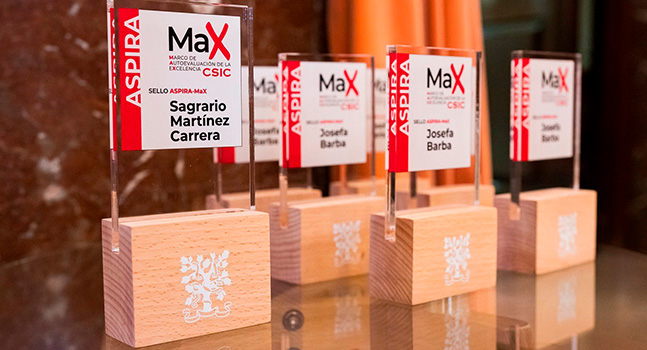24 de April de 2025
Geosciences Barcelona (GEO3BCN-CSIC) has been awarded the ASPIRA-MaX ‘Sagrario Martínez-Carrera’ seal of excellence by the Spanish National Research Council (CSIC). This recognition comes with funding of up to €300,000 to implement key aspects of the submitted excellence plan.
GEO3BCN received the award as part of the second call of the MaX-CSIC Project, which aims to expand opportunities for CSIC centers to advance toward scientific excellence and contribute to knowledge progress and economic, social, and cultural development. In this second round, around thirty CSIC centers have earned the distinction.
“We are very pleased with the result and want to emphasize that the achievement of this second seal belongs to the entire center. Everyone actively participated in preparing both the Scientific Project and the Excellence Plan. This funding will allow us to make a significant leap forward in scientific and technical excellence in the field of Geosciences,” said Santiago Giralt, director of Geosciences Barcelona.
To receive this distinction, centers had to submit a Scientific Project and an Excellence Plan based on a self-assessment questionnaire completed during phase I of the program. The scientific evaluation took into account factors such as the state of the art in the proposed fields, the center’s capacity to carry out the project, mechanisms to coordinate research lines and foster internal synergies, strategies to boost international scientific leadership, collaboration, knowledge transfer, and social, scientific, and economic impact.
The MaX-CSIC Project
The program is divided into three phases. In phase one, centers conduct a self-assessment and undergo an external evaluation. Those who succeed receive the ASPIRA-MaX ‘Josefa Barba’ seal, €20,000 in funding to develop a scientific project, and are admitted to the MaX-CSIC Project. GEO3BCN-CSIC obtained this recognition in the first call in 2024.
In the second phase, selected centers develop a three-year scientific project and excellence plan. After evaluation, those that qualify receive the ASPIRA-MaX ‘Sagrario Martínez-Carrera’ seal, with funding of up to €300,000.
In the third phase, the CSIC Scientific Advisory Committee evaluates the impact of the DEEP-MaX program at the center. Those who receive a positive evaluation are awarded the ASPIRA-MaX “Margalida Comas” seal, the highest recognition for scientific excellence granted by CSIC’s presidency.
Each seal is named after a notable woman scientist in one of CSIC’s three main scientific areas. Josefa Barba, a pharmacist and doctor in science, had a prolific career in neuroscience and learning; Sagrario Martínez-Carrera, a doctor in chemistry, worked in the Department of Crystallography at what is now the Blas Cabrera Institute of Physical Chemistry and was a key figure in mid-20th-century Spanish science; and Margalida Comas, a biologist and writer, contributed significantly to science education and gender equality in academia.

